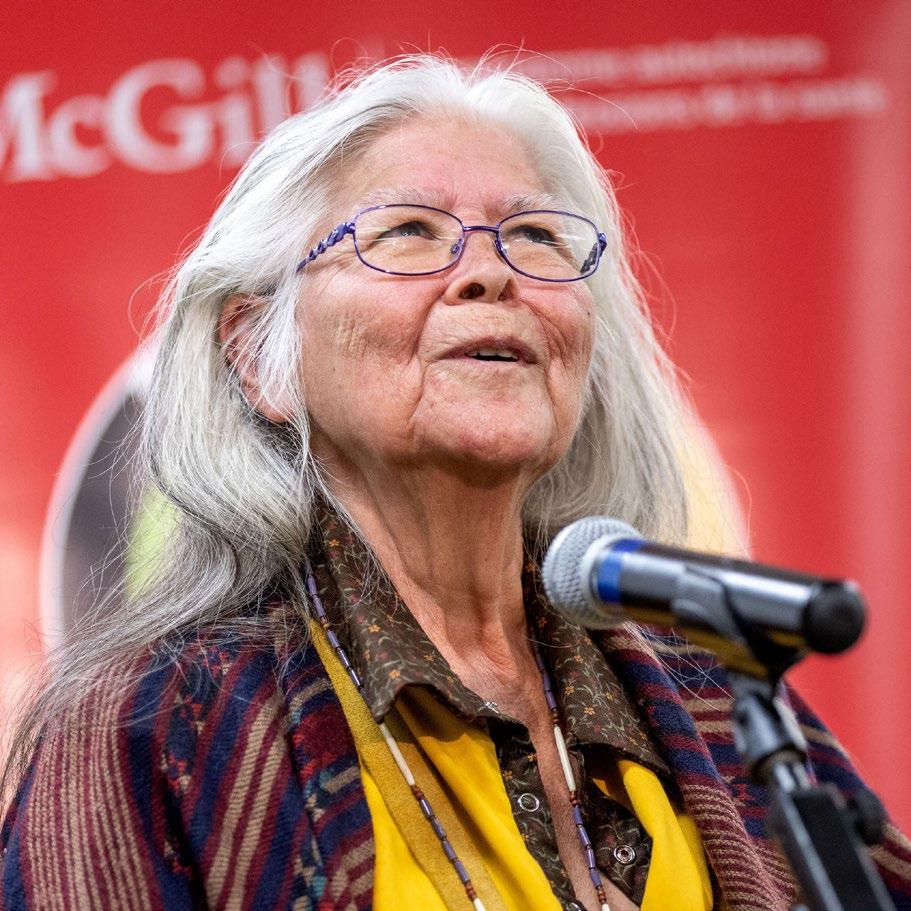
3 minute read
/ A new space for Indigenous health and community outreach
“We come together to celebrate and to share our thoughts.” With these words, Professor Alex McComber, Kanien’keha:ka (People of the Flint, Mohawk), Bear Clan from Kahnawake Territory, opened a very special event held on September 13, 2022.
With representatives from Indigenous communities in attendance, the Department of Family Medicine officially opened a new space dedicated to Indigenous health and community outreach within the health sector — the first of its kind at McGill.
As master of ceremonies, Professor McComber introduced the first speaker, Mrs. Amelia Tekwatonti McGregor, Kanien’keha:ka, an Elder from his community, who offered Ohenton Kariwatehkwen/The Words That Come Before All Else, in the Mohawk language. She was followed by the mother and daughter duo of Nina and Sierra Segalowitz, who captivated the audience with their Inuit throat singing.
“Physical representation and symbolic recognition are so very important,” said Celeste Pedri-Spade, PhD, Ojibwe, McGill’s Associate Provost of Indigenous Initiatives. “It is imperative that we transform the spaces and places where we come together to learn, in ways that First Nations and Inuit and Métis people see themselves reflected.”
She noted this new space is a testament to McGill’s commitment to making its campuses inclusive, welcoming, and successful places for scholars and students from First Nations, Inuit and Métis communities.
A hub of scholarship on Indigenous health

Dr. David Eidelman and Dr. Marion Dove were on hand to provide words of support and praise for this special occasion.
“It’s not surprising that the Department of Family Medicine has taken the lead in creating an Indigenous space,” said Dr. Eidelman, then Vice-Principal (Health Affairs) and Dean of the Faculty of Medicine and Health Sciences, who noted that Family Medicine has long championed primary care so that it is now front and centre in the Faculty. “We hope that, with these efforts, we go at least a small way towards making a difference, recognizing the importance of Indigenous communities, their contributions and relationship with the land.”
Chair of the Department of Family Medicine, Dr. Dove described the vision for the space, which will serve as a hub of scholarship on Indigenous health. “We want this space to create a focus on integrating Indigenous ways of knowing into the Western academic world, ” she said. “We want it to be a place to maintain Indigenous traditions through a program that will include kitchen table conversations, fireside chats, storytelling, and films.”
Dr. Dove also thanked Professor Neil Anderson, Dr. Howard Bergman, and Nathalie Moragues for supporting the operations behind the space.
Heartfelt reflections from Indigenous scholars
“We hope this space will succeed and be full of life and energy. But the work doesn’t stop today — the work starts today,” said Professor Richard Budgell, Inuk. He described an Inuit health and well-being concept called Inuuqatigiitsianiq, which refers to harmonious relations among people who share a place. He noted that diverse Indigenous communities had helped build the new space to make it welcoming and comfortable.
Professor Budgell also shared his aspirations to reconceptualize medicine by bringing in Indigenous perspectives. “There is a revolution taking place in this Department and Faculty to reconceive health in ways that meet the cultures of the people who are so frequently maltreated in health care systems.”
Dr. Ojistoh Horn, Kanien’keha: ka, shared her experience as a student at McGill. “One thing that was obvious during my education was that I was the only Indigenous person I ever saw. It was quite a lonely experience. To be in a place right now that is dedicated to the Indigenous voice is incredible. It’s a huge change from when I was here 30 years ago.”

Dr. Horn also noted the current realities of her work as an obstetrician. “We’re seeing our health care system fall apart in front of us after COVID. I want to see how we can support doctors, when they leave to work in our communities, to provide holistic care.”
Dr. Jennifer Robinson, Algonquin, a resident physician at St. Mary’s Hospital, shared some of her expectations of the new space. “We have a responsibility to develop protocols around how we’re going to use this space, and we have the right to implement practices that are responsive to the needs of Indigenous communities.”
Dr. Robinson noted it wasn’t that long ago that a First Nations person could not become a doctor without being disenfranchised.
“It’s incredible that I am here with one of the few First Nations doctors working within the community who is imparting her knowledge to me. As a First Nations person, I can see myself in another doctor for the first time.”










